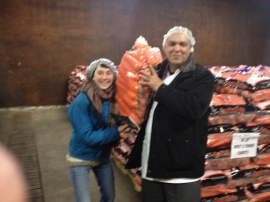 By Sarah Archibald – SYC’s Campus Food Systems Project Coordinator
By Sarah Archibald – SYC’s Campus Food Systems Project Coordinator
When we speak of the food system, we often use the sayings “farm to plate” or “field to fork”. Most of the time, we miss out on some key parts of the food systems when we forget to use terms like “modified atmosphere to box” or “ground to hydro-cooling station”.
Excuse me, modified hydro-what?
Let’s start at the beginning… Most of our food begins its life in the form of a seed or spore, it grows in the ground, or in trees and is often harvested by farmers and farm workers. This food can be directly sold on site or at farmers markets. However, most of the food we eat goes through a few more steps before reaching our plates.
Last week, as SYC’s Campus Food Systems Project Coordinator, I joined Toronto’s largest distributor of fruits and vegetables, Bamford’s Produce, on a tour of some of the lesser known aspects of the food system — the packing, cooling, and storing of food.
Though it was tough to wake up at 5:30 am, I realized that this was probably a sleep-in for most farmers and distributors! We met our Bamford’s Produce hosts at York University and were joined by York’s Nutrition Team, Farmers Market Coordinator, ARAMARKs VP Health and Wellness, the Food Service Manager, Communications Manager, two passionate chefs, and a staff member. As we drove to the first site, we had great conversations about our food knowledge and values including why we care about food and local food systems. Our different perspectives: ecological, health, nutrition, cooking, and economics demonstrated how incredibly diverse food is!
We arrived at Bradford Produce to the smell of fresh carrots, soil, and wafts of fresh onions. Bradford Produce is a farmer-owned packing and storage facility. Having a cooperatively owned packing and storage facility allows farmers to share machines and collectively gain health and safety certifications that facilitate their food to be sold to grocery stores, Universities, and other institutions. There are over 100 local farms that send their soil-covered carrots to be washed, sized, and packaged at Bradford’s facility. The cool temperatures and methods used at this facility, including hydro-cooling (essentially washing right away with cool water), will extend the shelf life of the carrots and keep them fresh until at least April 2014.
For our next stop we made our way just south of Georgian Bay – where some of the best apples in Canada are grown! This area, known as the Beaver Valley, has a microclimate that is perfect for apple production: a cool spring which delays apple blossom formation and a warmer fall which helps in maximum growth of apples. Here is where Bay Growers, a packing facility, processes and stores thousands of apples throughout the fall. Thousands of apples are stored in rooms with only 2% oxygen so that they stay fresh so that we can enjoy local apples throughout the year.
The tour was an amazing opportunity to see the innovations in the food systems and options for farmers to join together to have their products ready for local supermarkets and institutions. However, there is still a long way to go for these systems to be deemed “sustainable”. It was clear that consumer perception drives apple production, as apples with even small blemishes are not deemed good enough for normal consumption and are turned into juice. Moreover, the processors waxed every apple as they said “this is what consumers want”. The Campus Food Systems Project aims to educate consumers, especially students, about the food system so that we can understand why blemishes occur and which may one day result in our apples not being waxed and being produced with many fewer pesticides. Though going to your farmers market is an amazing option for asking how your food was produced, it isn’t an option for everyone. Distributors play an essential role in bringing food from field to fork and we’re excited that Bamford Produce and their partners focus on supporting local farmers, providing educational opportunities. They were so excited about SYC’s initiatives and hope that our generation of consumers can help drive sustainable food systems.



 Selon un sondage publié aujourd’hui, intitulé
Selon un sondage publié aujourd’hui, intitulé